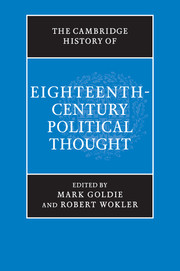Book contents
- Frontmatter
- Introduction
- Part I The ancien régime and its critics
- Part II The new light of reason
- Part III Natural jurisprudence and the science of legislation
- Part IV Commerce, luxury, and political economy
- 13 The early Enlightenment debate on commerce and luxury
- 14 Physiocracy and the politics of laissez-faire
- 15 Scottish political economy
- 16 Property, community, and citizenship
- Part V The promotion of public happiness
- Part VI The Enlightenment and revolution
- Biographies
- Bibliography
- Index
16 - Property, community, and citizenship
from Part IV - Commerce, luxury, and political economy
Published online by Cambridge University Press: 28 March 2008
- Frontmatter
- Introduction
- Part I The ancien régime and its critics
- Part II The new light of reason
- Part III Natural jurisprudence and the science of legislation
- Part IV Commerce, luxury, and political economy
- 13 The early Enlightenment debate on commerce and luxury
- 14 Physiocracy and the politics of laissez-faire
- 15 Scottish political economy
- 16 Property, community, and citizenship
- Part V The promotion of public happiness
- Part VI The Enlightenment and revolution
- Biographies
- Bibliography
- Index
Summary
Prologue: Babeuf
Early in May 1793 François Noël Babeuf changed his name to Gracchus. By doing so, he committed himself to a conception of the relationship between property, community, and citizenship (and a particular claim about the place of justice in the modern world) that was to lead, exactly three years later, to his arrest and, in 1797, his execution for conspiring to overthrow the government of the first French republic. Gracchus Babeuf first used his new name in an open letter to the procureur (procurator) of the Paris commune, Nicolas Chaumette (who had changed his own name to Anaxagoras, after the sixth-century bce Scythian leader, celebrated in Greek Cynic philosophy as a critic of Athenian luxury), on 7 May 1793, on the eve of an aborted Parisian insurrection on the night of 9–10 May 1793, when some of the leaders of the Paris commune and its forty-eight sections started, then abandoned, an armed attempt to force the French Convention to include the principle of ‘real equality’, as its advocates called it, in the articles dealing with the right to private property which were to be part of the new, republican, Declaration of the Rights of Man. In his letter, Babeuf called upon Chaumette to take the lead in convincing the Convention to accept the seven additional articles on the scale and scope of property rights which the Jacobin leader Maximilien Robespierre, in a speech to the Convention on 24 April 1793, had presented for incorporation into the new Declaration of Rights (Robespierre 1967, pp. 51–7).
- Type
- Chapter
- Information
- The Cambridge History of Eighteenth-Century Political Thought , pp. 465 - 494Publisher: Cambridge University PressPrint publication year: 2006
- 4
- Cited by



